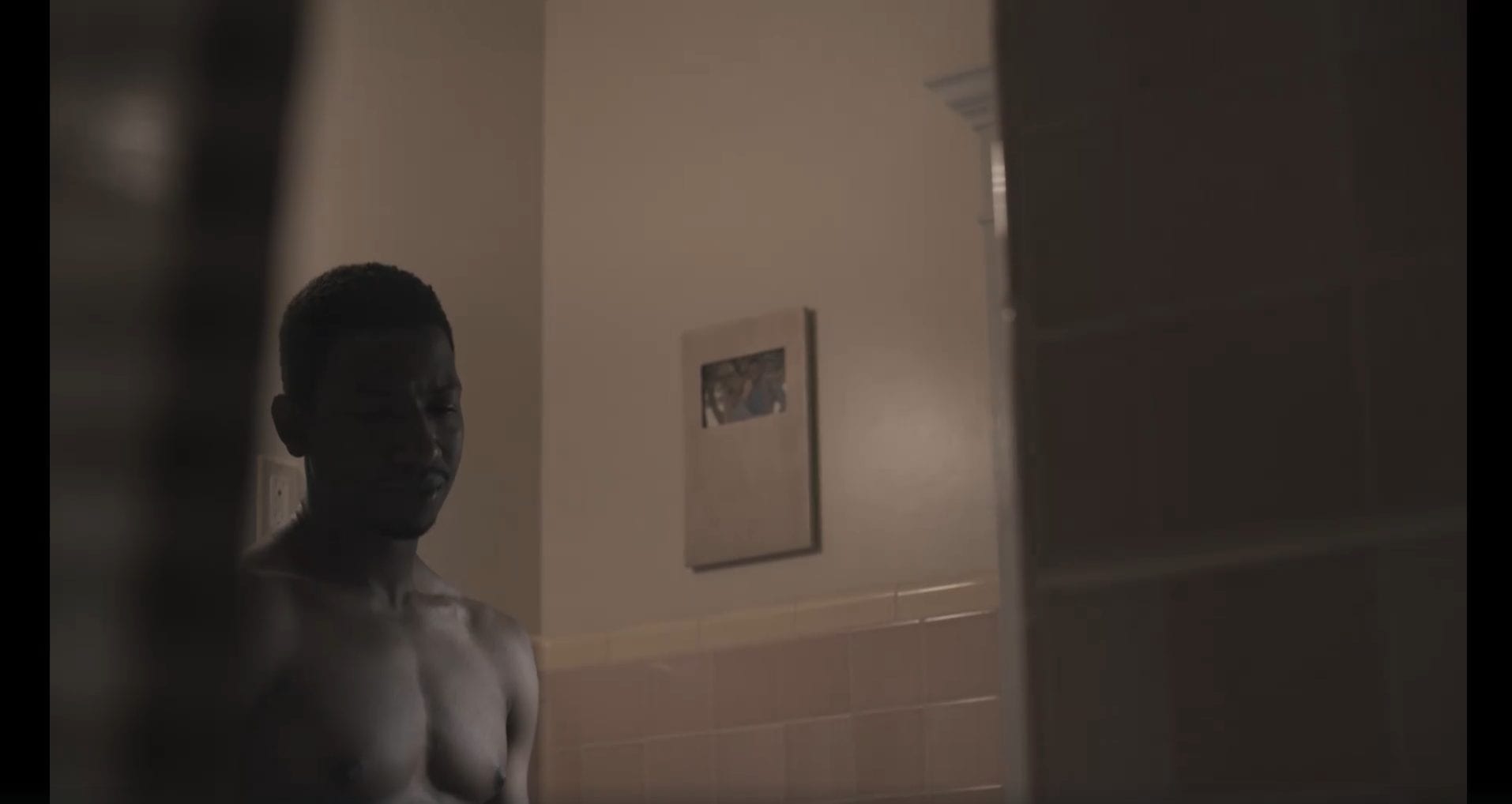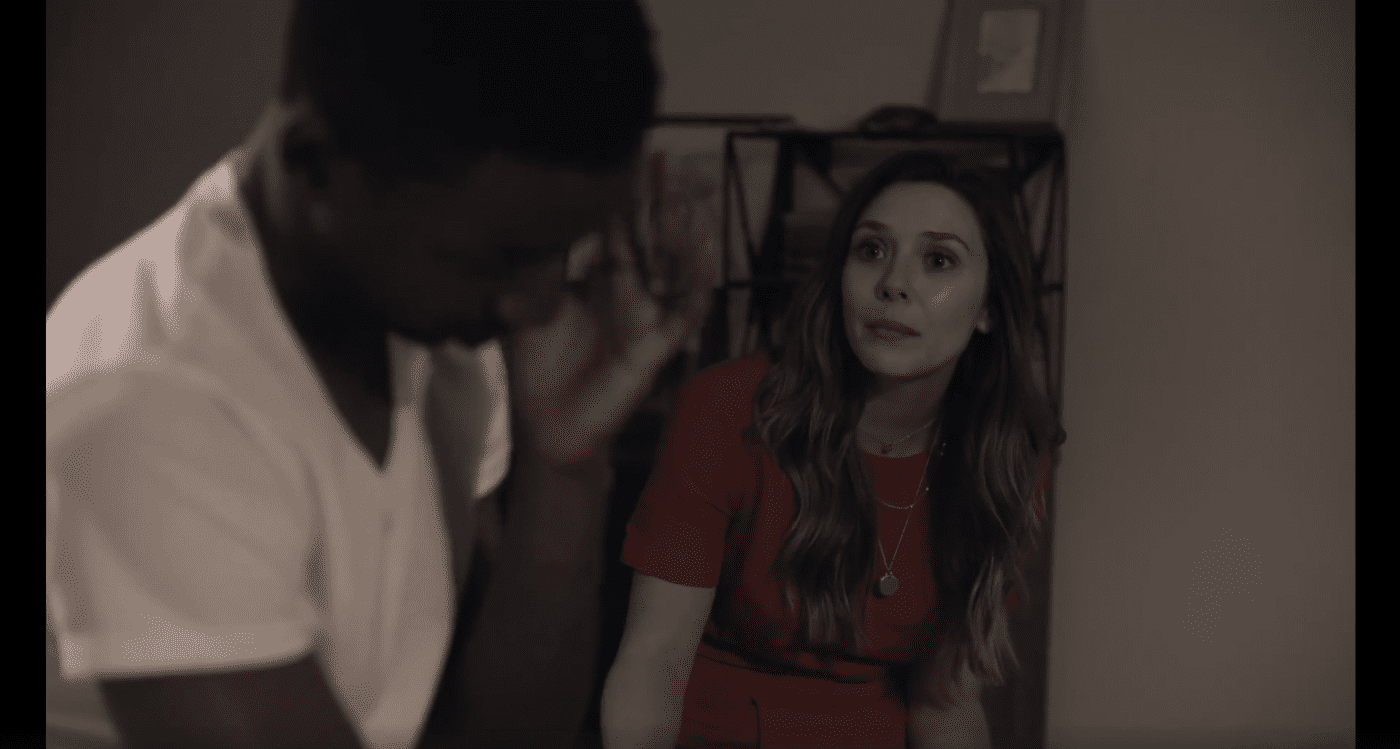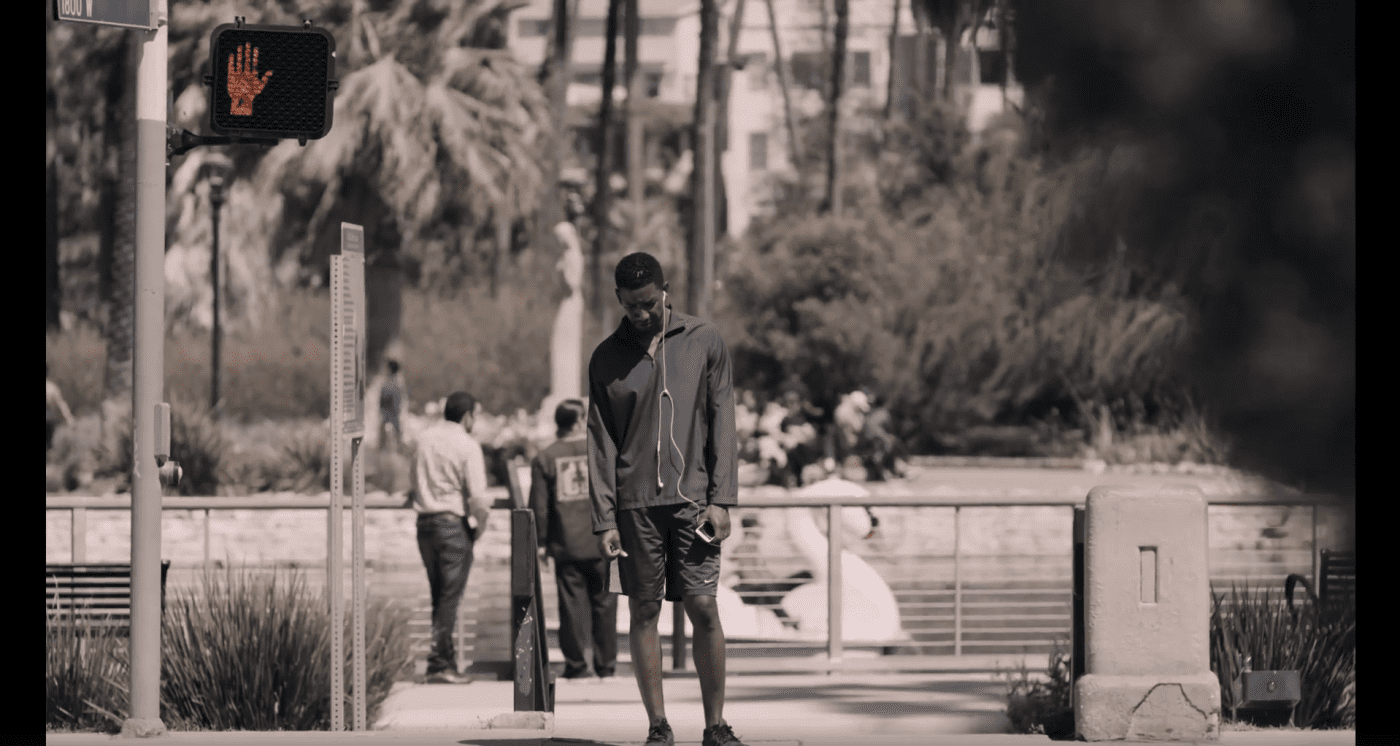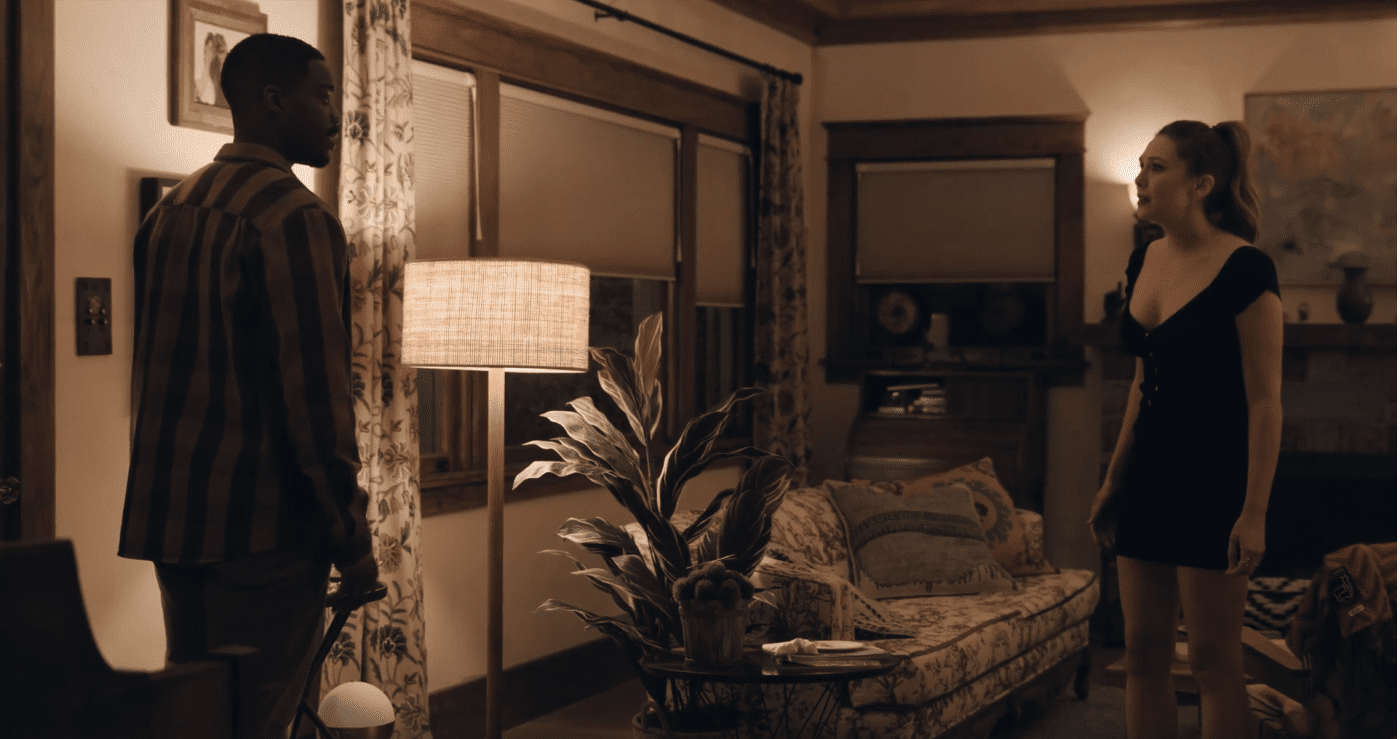In the previous article I wrote about Sorry for Your Loss, I mentioned how powerful a decision it was on behalf of series creator Kit Steinkellner to withhold the cause of Matt’s death. I cited that the reason he died wasn’t as important as seeing what his life meant to the people closest to him. As powerful as it was to show us the life of Matt from the perspective of those that love him, I was not prepared for the incredible impact of seeing what Matt’s life was like as he lived it. The fifth episode of Sorry for Your Loss is told entirely from Matt’s perspective, as Leigh’s long and trying quest to gain entry to his phone has finally paid off, and she prepares herself to listen to all the messages that Matt never got the chance to hear. Each voicemail she hears takes the audience directly to the point in Matt’s life and exposes what he was going through at the time the messages were left. The title of the episode itself offers a double meaning. There were messages on Matt’s phone that he either didn’t listen to before he died or were left after he died—unheard messages. As the episode progresses, we see Matt give many messages to many people that offer a glimpse into his depressive state, yet, were undetected by those with whom he was interacting. In a powerful and thought-provoking way, the audience travels into the depths of Matt’s mind, to understand the depression he suffered through daily, and to pick up on the unheard messages left for those around him.
Unheard Messages
The final days of Matt’s life aren’t wildly out of the ordinary from the days we have seen him live through the eyes of Leigh, Jules, or Danny previously, but what the audience is privy to throughout this episode is the hold Matt’s depression had over him, his work, relationships, and the way he saw the world. Matt laments to his therapist that he thinks his antidepressants may be losing their effectiveness as he fights a strengthening battle against “thoughts he can’t stop.” Matt’s therapist doesn’t do anything wrong in her response to him. She assures him that they can find another medication, and reminds him that he is allowed to feel happy and that she is determined to work with him to find the right combination of medicine and activities that will help him on his road to living a happier life. She brainstorms with him on ways he can fill his summer break from teaching with goals and motivations in hopes that the accomplishments will help him feel better. Matt calls his brother excited over a meeting with a potential publisher for the comic book he has been working on when Danny immediately tells Matt that his girlfriend broke up with him. Danny wasn’t acting selfishly; he didn’t know why Matt called and leaned on his brother for support through his breakup. The publisher who offered to publish Matt’s comic book didn’t realize that his constructive criticisms, despite his offer for publication, was the actualization of one of Matt’s greatest fears. Matt’s sudden death is all the more difficult to deal with to those closest to him because there is no one to blame. There is no negligence to point to and think if only that one thing had been different, this could have been avoided. This is the ultimate struggle with depression, no one besides the person suffering is aware of how all-consuming the disease is.

Matt expressed concern to his therapist that he was afraid of creative success. When pressed on why, he admitted that he was fearful of the possibility that publishing his comic—the thing he has wanted to do since he was a child—might not bring him happiness. “What if it gets published and it doesn’t make me feel better?” Matt believed that if he was able to reach the apex of his longest dream and it still didn’t make him happy, nothing would. During his meeting with the publisher, when he starts offering criticisms of Matt’s work, the publisher’s voice fades out, and Matt goes into his head driven by the overwhelming thoughts he cannot stop, his fears of not being good enough and never being able to attain happiness.
The power of perspective throughout Unheard Messages is incredibly potent. To put forward such a raw and true-to-life display of what it is like to suffer from depression was incredible to see. Many films and television shows illustrate what depression is “supposed” to look like, or how it is often described, similar to the way in which Leigh who told Matt she thinks she understands what it is like to live with depression because she read it in an article described as a thick fog descending over a sufferer. In reality, it is much more complicated to explain what it is like to live with depression because it’s so messy, and takes different forms and presents different difficulties depending upon the person afflicted. Sorry for Your Loss does an incredible job of painting many common issues that those of us with depression face. We see Matt being hit with his depression as soon as he wakes up in the morning, struggling through completing everyday tasks, being consumed by his thoughts, struggling with making decisions, not wanting to go anywhere or be around people, feeling like an occupational failure. Depression is a mental illness that occupies so much of the brain space of someone who suffers from it that when we finally make it through our daily obligations we’re thoroughly exhausted, and often have nothing else left to give. Dinner parties like the one Matt and Leigh attend are not a fun venture for someone in the midst of a depressive episode. Depression often comes with the burden of feeling as though someone that suffers must keep their suffering close to the vest. We often feel as though no one would want to be around us if we didn’t put our mask on and face the day.

I can no longer count the number of times someone has told me “I would never have known you have depression if you didn’t tell me.” I make a concerted effort to be as happy as I can around others, to listen and be there for people, and to always try to make sure the people I spend time with have a good time. I know what it’s like to be sad and feel like you have no one. I’m all of my friend’s therapist, and I want to be there for people and talk them through whatever they need to discuss because I know how hard it is to feel like nothing can make you feel better. I’ve always had this belief that it is the people with such overwhelming struggles that have the most empathy because they know what it’s like on the other side and have this desire to help people not know that feeling by being there for them. We see this with Matt in Sorry for Your Loss, too. During his final days, Matt helps Jules through another of her drunken nights; he tries to counsel his brother through a breakup, he plans a nice dinner for him and Leigh, trying to be there for everyone despite his silent suffering. Matt doesn’t tell anyone the struggles he is feeling with his job and feeling like a failure as a teacher. He never tells anyone about the publishing opportunity; he doesn’t share his unhappiness or trepidation in starting a new prescription routine with anyone other than his therapist. Matt buries his struggles so he can be there for everyone else. He shoulders the burden of his emotions all on his own and expresses hyper-empathy to all of those around him.
We see now why Jules describes Matt as “the glue that held us together” he was there for anyone at any time of day or night regardless of what he was feeling himself. In a surprising twist, we also now understand why a credit card was found in the freezer when Leigh, Jules, and Amy were cleaning out her apartment. Matt’s empathy drove him to donate to a cause to save the last male, white rhino. Matt described sadness upon discovering that the rhino had died when he said: “we killed off every single creature like him and now he’s gone.” He lamented that he always donates to “bummer things” like that and Leigh wouldn’t understand because she doesn’t know what it’s really like to live with depression. This struggle of living with an illness so difficult to describe to someone that doesn’t suffer is—what I often experience as—one of the greatest struggles of depression because you feel so alone and unable to be understood. Coupled with the requests from well-meaning people to “tell me if there’s anything I can do, or any way I can help” which often feels overwhelming to someone with depression because it put the burden of coming up with answers for other people back on us when we can’t even think of solutions for ourselves.

Another exceptional aspect of this episode is the way it shows how so often someone with depression tries everything they can and everything that’s recommended to them and still don’t feel better. I cannot describe how furious I become when someone that commits suicide is called a coward or selfish, or as someone that took the easy way out. People that say this have no idea how hard someone with depression works at life. They don’t know how hard we work and how many attempts we make at feeling better. Matt tried everything: he meditated, he ran daily, he kept up with his therapy, he was diligent about his medication. The final message Leigh listens to on Matt’s phone was one from his brother, left after Matt had died. It is in this moment that the cause of Matt’s death is revealed to the audience. Danny’s message, and the flashback that follows divulge that Matt died while hiking. His family were told that it was an accident and that he fell 42 feet to his death below the hiking trail. Danny called his brother’s phone while he was visiting the trail, wishing Matt could explain what happened. Danny expressed doubts that he fell, instead, thinking that he jumped and made the decision to end his life the day that he died. Leigh’s reaction to hearing Danny’s voicemail makes clear that she never considered the possibility that Matt may have committed suicide. Leigh is overcome with emotion at this thought while also seeming to admit to herself that Danny is probably right, further cementing his claim made at the beginning of the season that there was much about her husband that she didn’t know. Devastated by the seeming intentionality of Matt’s death throws Leigh’s entire grieving process and the future of her own life into question.
I Want a Party
The revelation that Matt may have committed suicide as a result of his depression leads to Leigh admitting that fact in grief group the day before her birthday in the sixth episode of the series. Leigh admits to feeling stupid that she never thought of that possibility despite being aware of Matt’s mental illness. Leigh’s share at grief group allows the audience to understand why she has been so curt to those with whom she interacts. When Leigh believed that Matt tripped, she took out her anger on the universe as a scapegoat for taking her husband away. The epiphany that Matt may have caused his death means, to Leigh, that the only person she had to be angry towards was Matt. Being the type of person Leigh is, this causes her to reevaluate her grief process, and to make choices for her own life.

At the breakfast table with Amy and Jules, the women discuss how difficult Leigh’s birthday may be for her, with Amy warning that she may be more difficult than usual. When an ecstatic Leigh comes rushing into the kitchen excited over the café goodies Amy brought home to treat them with for Leigh’s birthday, her jovial disposition surprises her support system. Leigh makes an off-handed comment that doesn’t mean as much to Jules and Amy as it means to the audience when she says: “we all make choices and I am choosing to have a great birthday.” Clearly, the control-oriented Leigh has taken the new information she believes about Matt’s death and applies it to her own life. She seems intent on forcing herself into “moving on” and making decisions for herself that more closely align to the life she used to live. Leigh almost seems intent on proving that the choices one makes for themselves carry an incredible impact and seems to be forcing herself into many things she may not be ready for. Leigh says to Amy “I don’t want to be self-conscious anymore, or negative, or judgmental, or sad, I don’t want to be that person anymore” which seems to illustrate her new belief that people are free to make whatever choices they want with their lives, even if that means reinventing oneself every day.
Part of taking her life back includes visiting her best friend, and former editor Drew about the advice column she started. Drew desperately tried to get Leigh to resume the column after Matt died, but Leigh wasn’t ready yet, fearing that she had changed too much and was too different a person from the person who started the column. Staying consistent with her theme of making choices for oneself and living life deliberately, rather than letting things happen to you, Leigh asks Drew if she can come back to the column and begin writing again. As much as Drew hates the way things happened and wants Leigh to come back, her replacement had taken the column to a level of success that it had never reached before and Drew understands that the managing editor above him will not give the column back to Leigh. The realization that her life won’t be as easy to simply choice into being as she thought it would be is the first blow to Leigh’s new plan.
Leigh shocks everyone when she decides that she wants a party on her first birthday after Matt’s death. Amy and Jules temper their surprise in exchange for being supportive of what Leigh wants and what will make her happy. Leigh tells them she will take care of the details and all will come together, and they will have a fun time. While making her guest list on Facebook, Leigh comes across Matt’s name and decides it will be easier to invite her entire friends’ list rather than make decisions about who to invite individually. Leigh soon learns that no matter how hard she tries to will herself into happiness and away from grief, reality creeps in and reminds her that she cannot compartmentalize her feelings and set aside time to mourn, her grief is a part of her now. In addition to the pain of Leigh, we also see Amy and Jules’ pain throughout this episode and how much they push it aside to help Leigh. Jules, struggling with her sobriety after being confronted with the setting where she would have normally had consumed alcohol to excess was a lot for her to handle at Leigh’s birthday party. Jules sneaks away to an A.A. meeting to confront her pain. Amy recognizes her pain as well, her disappointment over not being able to expand her business as she had hoped, and the loss of her savings to paying for alcohol rehab for Jules, and the dozens of ways she pushes her needs and wants aside every day to help Leigh through her grief process. Seeing the pain in those around Leigh created a compelling arc to the theme of choices that ran through the episode.

Unsurprisingly, the party did not go well, no matter how much Leigh wanted it to. She was confronted by people who offered the same condolences she admitted to Danny in an earlier episode that she was tired of hearing. She was flooded with memories and disappointments that couldn’t be pushed away just because this was a party and people were supposed to have fun. The night ends with a forced confrontation with Danny in which Leigh asks him if he thinks Matt jumped to his death. She doesn’t let on that he heard the voicemail he left on Matt’s phone, and instead wants to hear what he thinks. He immediately says no, when Leigh uses the logic he left on Matt’s unheard message citing his mental illness and his familiarity with that hiking trail. Was it Leigh’s intention to throw this entire party to have this moment with Danny, where she could face this possibility that her husband committed suicide, something she had never thought of before hearing Danny’s voicemail? Perhaps. Or maybe Leigh was merely determined to make choices and define her life herself, in terms other than what happened to her husband. Whatever the motivation was for the party, the discussion with Danny represented the first time, other than in the grief group, that Leigh verbalized the real possibility that her husband may have killed himself. This was a huge moment for Leigh, and a huge moment for Danny, as the two of them are also realizing that their mourning over Matt’s death is probably more similar than anyone else who mourns him. They have a connection that no one wants to share yet that they cannot escape. What started as an adversarial relationship has slowly developed into a kinship over their love of Matt and their mourning over him. Each of them represents to the other a link to Matt and seeing them being able to work beyond whatever animosity existed between them before is a powerful statement on the unifying human experience unique to death.


Do you think the study on people’s degree of happiness mentioned by Matt to Danny is a real study? I would love to read it if so.